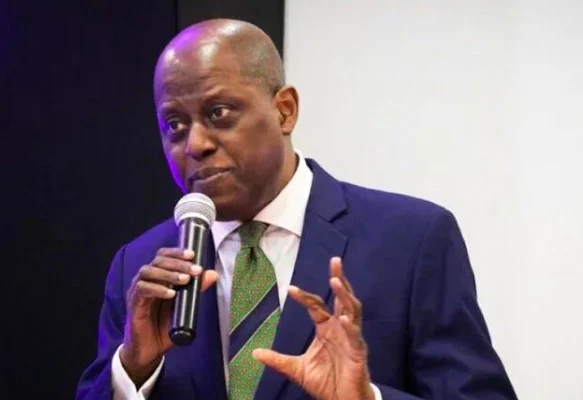By Tony Obiechina, Abuja
The Central Bank of Nigeria (CBN) has unveiled some of the policy directives that will boost foreign exchange inflow and improve naira valuation against the United States dollar.
The CBN Governor, Olayemi Cardoso said the bank has approached the Ministry of Finance and the Nigerian National Petroleum Company Ltd to return all foreign exchange inflows to the Bank.
According to him, the move is targeted at enhancing CBN’s Forex flows and contributing to the growth of the country’s reserves.
Cardoso stated this in his keynote address at the launch of the NESG 2024 Macro Economic Outlook with the theme: “Economic Transformation Roadmap: Medium-Term Policy Priorities” held in Lagos on Wednesday.
He said, “We believe that the naira is currently undervalued and, coupled with coordinated measures on the fiscal side, we will expedite genuine price discovery in the near term. This coordinated approach will contribute to a more balanced and stable exchange rate.
“Our collaboration with the Ministry of Finance and the NNPCL to ensure that all FX inflows are returned to the Central Bank. This coordinated effort will greatly enhance the Bank’s FX flows and contribute to the accretion of reserves.”
The apex bank boss pointed out that the country’s FX situation will improve in 2024 despite the setback of the naira which is trading at N1,390 per dollar at the black market.
He, however, linked the expected stability in the foreign exchange market in 2024 to the reduction in petroleum product imports and the market-determined exchange rate.
Cardoso said, “We are implementing a comprehensive strategy to improve liquidity in our FX markets in the short, medium, and long term. Our focus is on addressing fundamental issues that have hindered the effective operation of our markets over the years.
“Upholding the integrity of financial markets is crucial for building confidence. With the completion of an independent forensic review and the subsequent clearance of the backlog of valid FX transactions, we remain steadfast in our commitment to decisively address any infractions and abuses.
“In our efforts to stabilize the exchange rate, it is imperative that we prioritize transparency and create a market environment that enables the fair determination of exchange rates, ensuring stability for businesses and individuals alike.”
In his opening remarks, the Chairman of the NESG, Mr. Niyi Yusuf said the year 2023 presented challenges, marked by the rigorous implementation of demonetisation policies, widespread insecurity and a fiercely contested general election, aggravating preexisting macro and structural issues.
According to him, these challenges significantly impacted Nigeria’s socio-economic landscape and macroeconomic performance, adding that with the dawn of a new government, “we find ourselves at a transformative juncture ripe with political and economic opportunities to address these challenges, optimise our potential, and achieve vital developmental objectives”..
Yusuf pointed out that despite a trade surplus, foreign capital receipts were below expectations on the external front, and the official and unofficial naira exchange rates depreciated beyond the planning expectations of most businesses, adding that, Nigeria’s reference crude oil price declined, posing fiscal challenges as public debt rose.
He said, “Notably, higher prices in 2023 resulted in a decline in the real purchasing power of the minimum wage, and an estimated 4 million Nigerians were pushed into poverty. While the government has implemented interventions, more effort is urgently needed to reverse the country’s weak and non-inclusive growth narrative.
“Building on the NESG #NES29 theme, “Pathways for Sustainable Economic Transformation and Inclusion”, this year’s macroeconomic outlook underscores “Medium-term Policy Priorities” to expedite the transformation process and enhance the socio-economic well-being of Nigerians. READ ALSO:
- Wumi Toriola Praises Femi Adebayo Over His Latest Netflix Movie ‘Seven Doors’
- Ex-Olympics Gold Medallist, Chioma Ajunwa in Morocco for CAF Awards ceremony
- Ex-DMW Signee Mayorkun Reveals His Life-changing Encounter With Davido
- Hijab: UCH, Others Oppressing Muslim Students, MURIC Cries Out
- 2024 CAF Awards: Ademola Lookman Waiting To Be Crowned
“The Economic Transformation Roadmap outlines three phases of policy sequencing, focusing on monetary stability, effective fiscal management, local content improvement, domestic productivity enhancement, incentives to motivate private sector investments, and human, social, and natural capital development.
“As we delve into these policy priorities, we must emphasise the pivotal role of a robust policy environment in laying the foundation for sustainable Macroeconomic stability and economic transformation. We recognise the current administration’s efforts in stabilising the economy, but given the depth of the problems, more still needs to be done and quickly too. We must not relent to build the Nigeria of our dreams. I implore every stakeholder to rise to this occasion and contribute to our quota in rebuilding our economy”.
Further, he Chaiman said the NESG stands ready to continue its collaborative efforts with the Federal and subnational governments to achieve these transformative goals; a concerted and coordinated approach and effective policy implementation will propel Nigeria towards a more resilient, inclusive and prosperous future.
“We trust that this Macroeconomic Outlook launch event will not only stimulate discussions but also serve as a catalyst for decisive actions. I extend my best wishes for fruitful deliberations”, he added.


